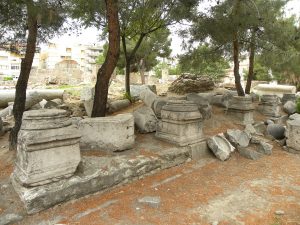We move on to the fourth of the seven letters in Revelation. This time, the letter to the corrupt church in Thyatira. Jesus has good things to say about the church in Thyatira. Some bad things as well. So once again, part of the examination will be about the relationship, if any, between the good and bad statements.
The letter to the corrupt church in Thyatira - Revelation is article #4 in the series: Seven Letters to Seven Churches. Click button to view titles for entire series
Once again, the title comes from the section title in the NKJV. As with most of the churches, the title refers to the content of the letter, rather than how Jesus referred to Himself as the author of this letter. Therefore, looking at the corruption - how it came to be, who is following and / or supporting it, Etc. - will be high on our list of things to check out.
First - Blessings in the Seven Letters
If you're going through the series, you've seen this portion before. I'm including it for each letter for those who may only be checking out one of the seven letters.
The Book of Revelation starts with these verses:
Rev 1:1 The revelation of Jesus Christ, which God gave him to show his servants what must soon take place. He made it known by sending his angel to his servant John, 2 who testifies to everything he saw—that is, the word of God and the testimony of Jesus Christ. 3 Blessed is the one who reads the words of this prophecy, and blessed are those who hear it and take to heart what is written in it, because the time is near.
We learn something of the importance of each of the letters from this passage. Of course, we get a modern-day evidence chain of sorts, to let us know this is from God. And while John is the recipient of the vision, we saw:
3 Blessed is the one who reads the words of this prophecy, and blessed are those who hear it and take to heart what is written in it ...
Just like when Jesus spoke of things like love and believe, He was also saying that the love and belief should be so strong as to bring about action on our part. Not our action alone - and not action to gain love or to have stronger belief. No - it's about faith and love that are stronger than anything we could ever have ourselves, because it's God's meaning of faith and love that we can only achieve with the Holy Spirit.
Then the action follows from having the Holy Spirit. And with the Holy Spirit working through us, the actions that we carry out will come from God and be effective the way He intends them to be. In short - it's not about us. It's about God.
When we see Blessed is the one who reads the words of this prophecy, and blessed are those who hear it and take to heart what is written in it, all of that involves action as a result of having read or heard the prophecy. It takes the Holy Spirit to understand the words, to take them to heart. And once we do that - we should have a desire, also coming from the Holy Spirit, to act on the words. Both for ourselves and for others.
It's a message that God wants us to hear/read - and then do something with it. As we'll see, each letter speaks to what Jesus has for and against each of the churches. He lets us know very clearly where we stand in relation to what He wants. To what He taught. Our goal is to be more Christ-like, and when we read this, we can look for ourselves in the letters and know just where we are.
Praying about the Seven Letters and ourselves
We'll start with praying portions of Psalm 139. Remember that these letters are for us today, as much as for those at the time John put pen to scroll and everyone in between. One really good way for us to ask God to let us know which parts of these letters apply to us as individuals, families, small groups, churches, Etc. is to literally ask Him! And to listen for a response.
As such, let's begin by praying the verses below, from David to God.
Psalm 139
For the director of music. Of David. A psalm.
Ps 139:1 O LORD, you have searched me
and you know me.
Discover more from God versus religion
Subscribe to get the latest posts sent to your email.
